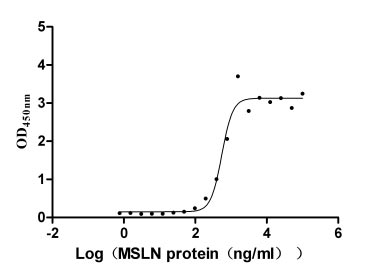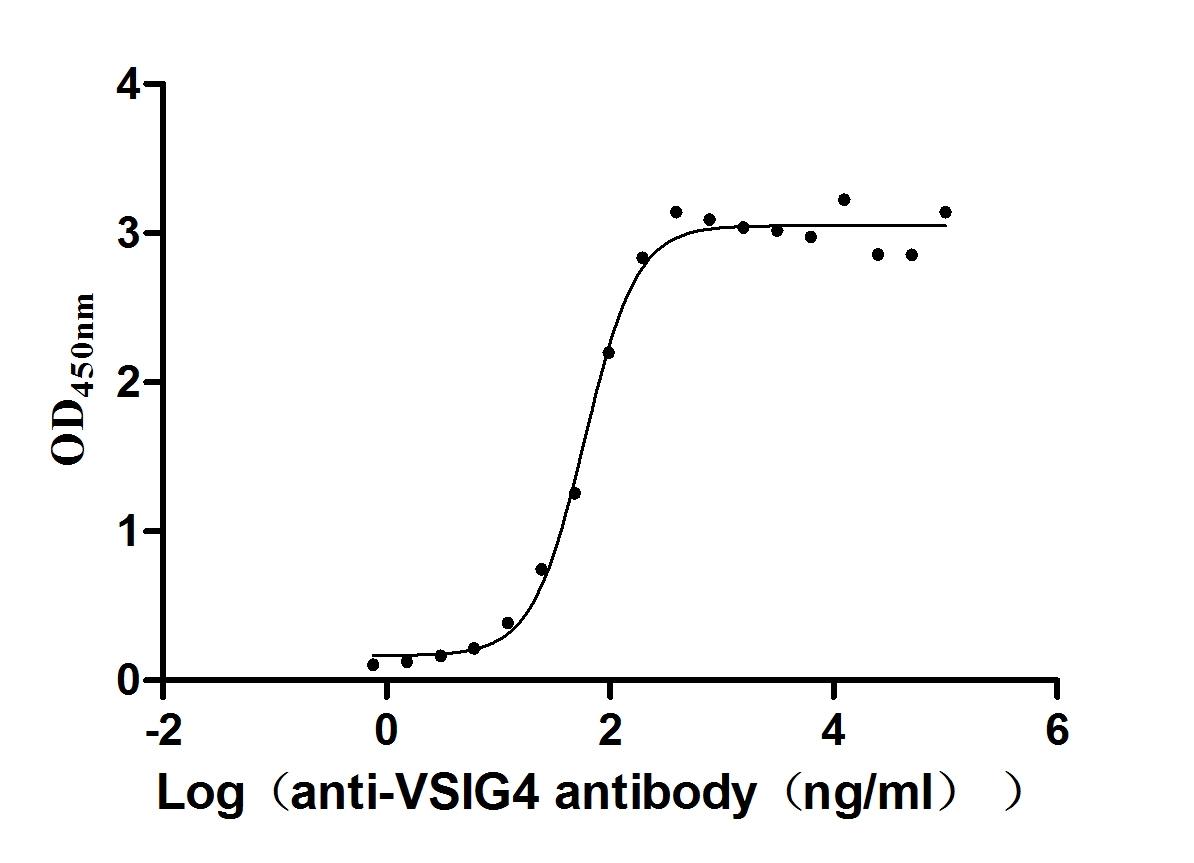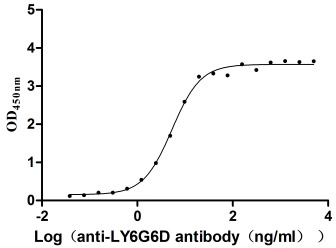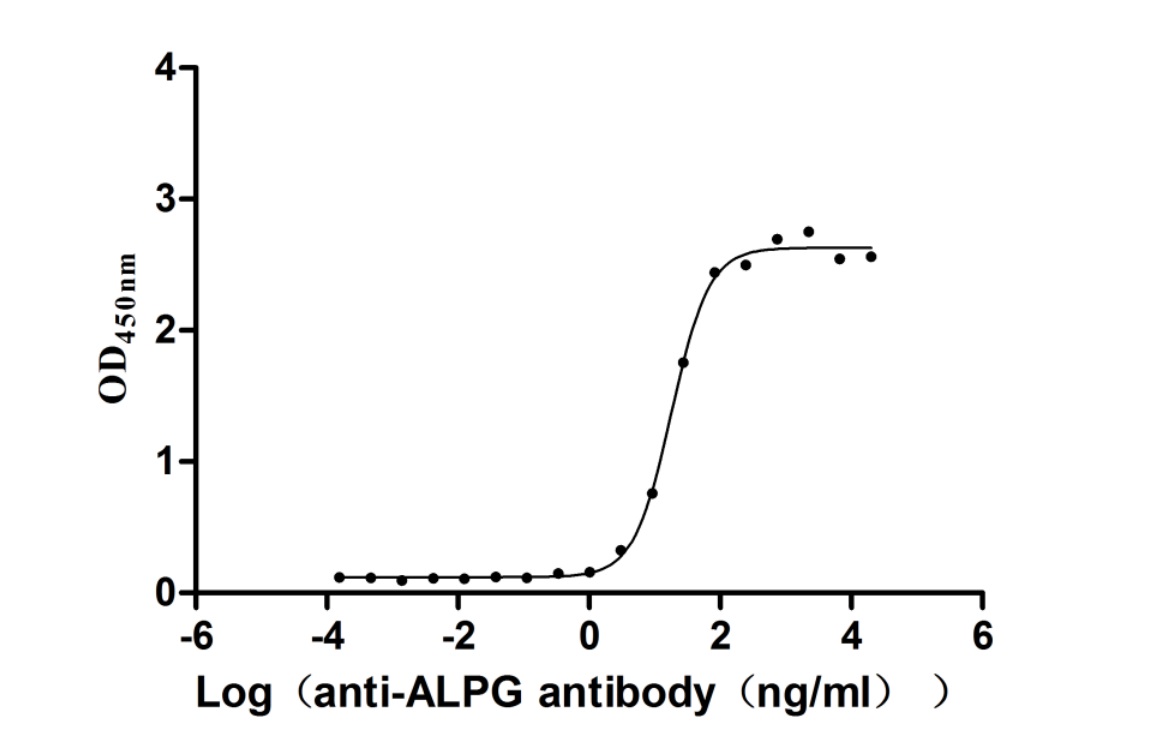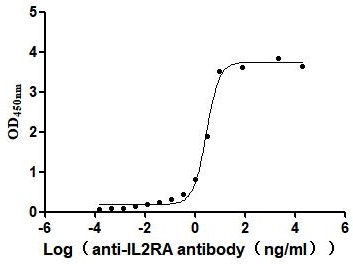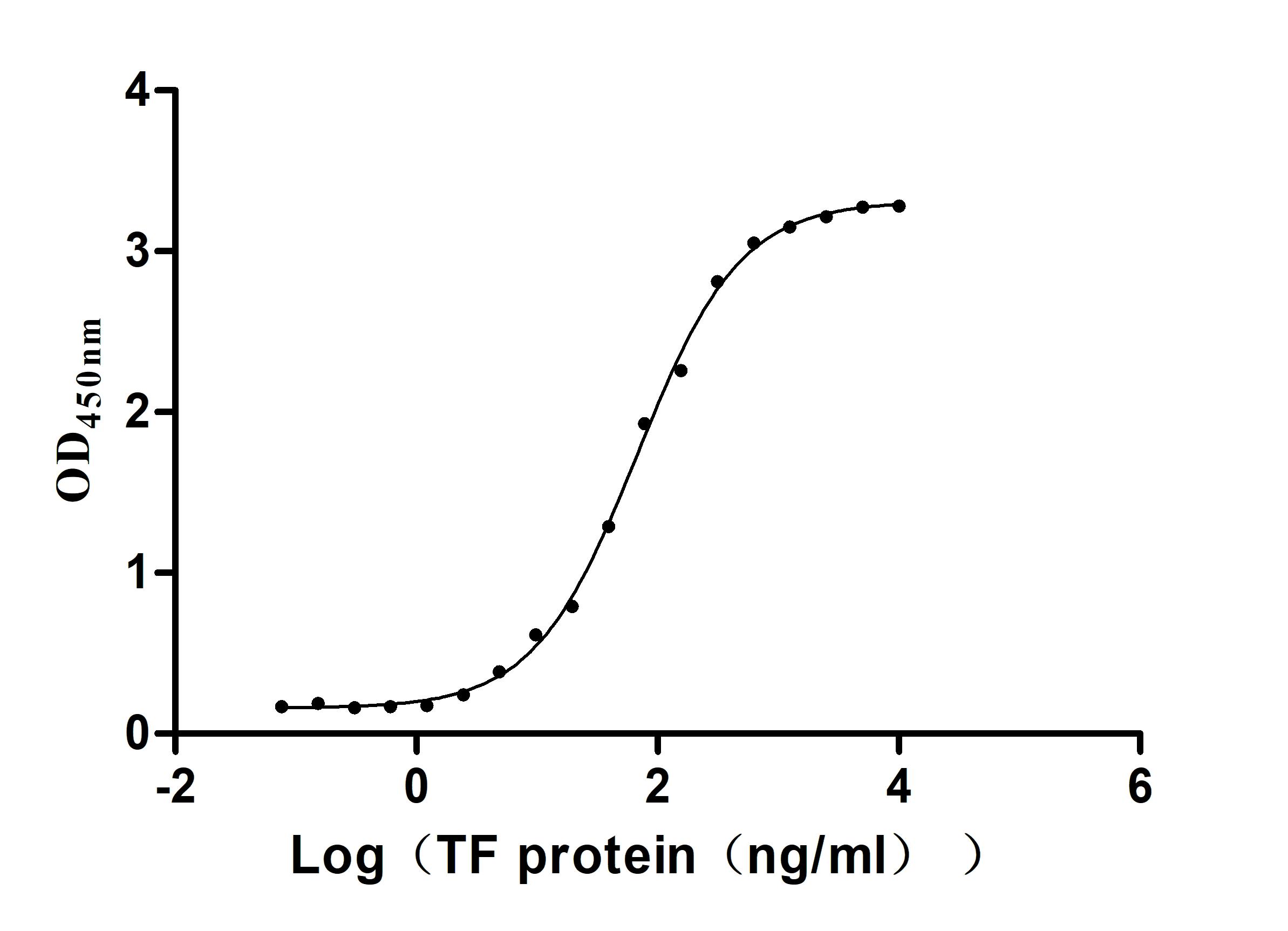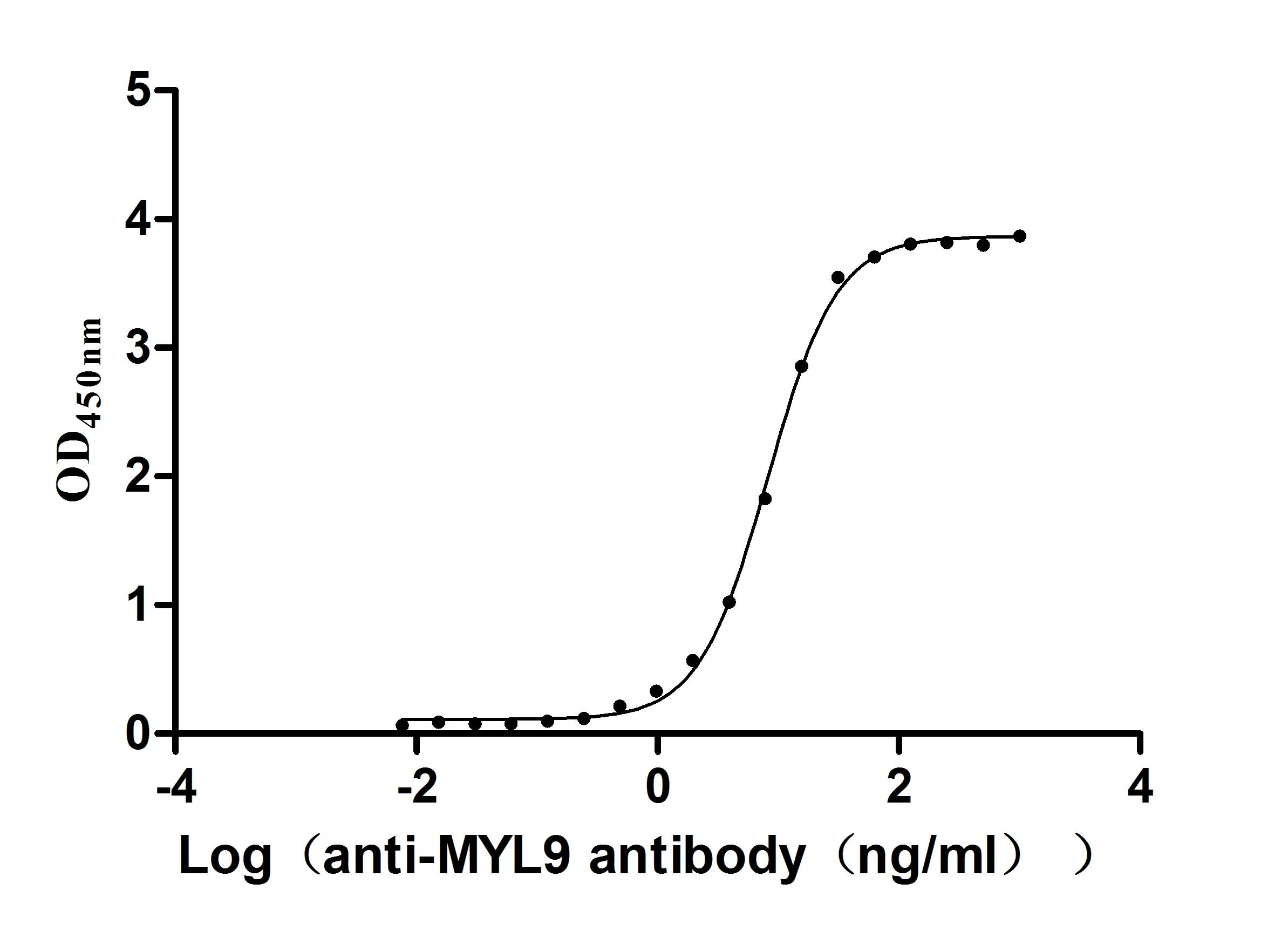Recombinant Mouse Roundabout homolog 1 (Robo1), partial
-
中文名称:小鼠Robo1重组蛋白
-
货号:CSB-EP020054MO
-
规格:
-
来源:E.coli
-
其他:
-
中文名称:小鼠Robo1重组蛋白
-
货号:CSB-EP020054MO-B
-
规格:
-
来源:E.coli
-
共轭:Avi-tag Biotinylated
E. coli biotin ligase (BirA) is highly specific in covalently attaching biotin to the 15 amino acid AviTag peptide. This recombinant protein was biotinylated in vivo by AviTag-BirA technology, which method is BriA catalyzes amide linkage between the biotin and the specific lysine of the AviTag.
-
其他:
-
中文名称:小鼠Robo1重组蛋白
-
货号:CSB-BP020054MO
-
规格:
-
来源:Baculovirus
-
其他:
产品详情
-
纯度:>85% (SDS-PAGE)
-
基因名:Name:Robo1 Synonyms:Dutt1
-
Uniprot No.:
-
别名:Robo1; Dutt1; Roundabout homolog 1
-
种属:Mus musculus (Mouse)
-
蛋白长度:Partial
-
蛋白标签:Tag type will be determined during the manufacturing process.
The tag type will be determined during production process. If you have specified tag type, please tell us and we will develop the specified tag preferentially. -
产品提供形式:Lyophilized powder
Note: We will preferentially ship the format that we have in stock, however, if you have any special requirement for the format, please remark your requirement when placing the order, we will prepare according to your demand. -
复溶:We recommend that this vial be briefly centrifuged prior to opening to bring the contents to the bottom. Please reconstitute protein in deionized sterile water to a concentration of 0.1-1.0 mg/mL.We recommend to add 5-50% of glycerol (final concentration) and aliquot for long-term storage at -20℃/-80℃. Our default final concentration of glycerol is 50%. Customers could use it as reference.
-
储存条件:Store at -20°C/-80°C upon receipt, aliquoting is necessary for mutiple use. Avoid repeated freeze-thaw cycles.
-
保质期:The shelf life is related to many factors, storage state, buffer ingredients, storage temperature and the stability of the protein itself.
Generally, the shelf life of liquid form is 6 months at -20°C/-80°C. The shelf life of lyophilized form is 12 months at -20°C/-80°C. -
货期:Delivery time may differ from different purchasing way or location, please kindly consult your local distributors for specific delivery time.Note: All of our proteins are default shipped with normal blue ice packs, if you request to ship with dry ice, please communicate with us in advance and extra fees will be charged.
-
注意事项:Repeated freezing and thawing is not recommended. Store working aliquots at 4°C for up to one week.
-
Datasheet :Please contact us to get it.
相关产品
靶点详情
-
功能:Receptor for SLIT1 and SLIT2 that mediates cellular responses to molecular guidance cues in cellular migration, including axonal navigation at the ventral midline of the neural tube and projection of axons to different regions during neuronal development. Interaction with the intracellular domain of FLRT3 mediates axon attraction towards cells expressing NTN1. In axon growth cones, the silencing of the attractive effect of NTN1 by SLIT2 may require the formation of a ROBO1-DCC complex. Plays a role in the regulation of cell migration via its interaction with MYO9B; inhibits MYO9B-mediated stimulation of RHOA GTPase activity, and thereby leads to increased levels of active, GTP-bound RHOA. May be required for lung development.
-
基因功能参考文献:
- Low Robo1 expression is associated with developmental defects of cranial frontal and parietal bones. PMID: 28987541
- Contralateral migration of oculomotor neurons is regulated by Slit/Robo signaling. Results demonstrate that a migratory subset of motor neurons respond to floor plate-derived Slit repulsion to properly control the timing of contralateral migration. PMID: 27770832
- While Slit1 and Robo2 are only expressed in peripheral axons and their cell bodies, Slit2, Slit3 and Robo1 are also expressed in satellite cells of the dorsal root ganglion, Schwann cells and fibroblasts of peripheral nerves. PMID: 28234971
- restoration of miR-218 inhibited retinal angiogenesis via targeting Robo1. MiR-218 contributed to the inhibition of retinal angiogenesis and miR-218 might be a new therapeutic target for preventing retinal neovascularization.. PMID: 26960375
- Robo1-Slit2 interaction required for pathfinding mechanism essential to establish the functionally important habenulo-interpeduncular connection. PMID: 25366972
- FLRT3 is a Robo1 coreceptor in developing axons. PMID: 24560577
- Slit2/Robo1 signaling promotes intestinal tumorigenesis through Src-mediated activation of the Wnt/beta-catenin pathway. PMID: 25605242
- Robo1/2 regulate follicle atresia through manipulating granulosa cell apoptosis in mice PMID: 25988316
- Roundabout receptor (Robo) genes are expressed in pulmonary neuroendocrine cells (PNECs), a rare, innervated epithelial population. Robo inactivation in mouse lung results in an inability of PNECs to cluster into sensory organoids and triggers increased neuropeptide production upon exposure to air. PMID: 26743624
- Cardiac defects in mutants for Robo or Slit range from membranous ventricular septum defects to bicuspid aortic valves. PMID: 25691540
- Slit2 signaling through Robo1 and Robo2 has a role in retinal neovascularization PMID: 25894826
- This study demonistrated that significant increase of interneurons in the cortices of Robo1-/- mice, implicate Robo1 in the regulation of progenitor cell dynamics in the developing forebrain. PMID: 24741061
- we report that Robo1 plays an important role in guiding olfactory sensory neurons in the mouse olfactory system during development. PMID: 23821580
- SDF-1-CXCR4 differentially regulates autoimmune diabetogenic T cell adhesion through ROBO1-SLIT2 interactions in mice. PMID: 23811810
- These results demonstrate that Robo receptors play a crucial role in neocortical lamination and particularly in the positioning of layers II/III pyramidal neurons. PMID: 22661412
- During stroke recovery, a transient reduction in Robo1 expression on the cerebral endothelial cells allowed the uncontrolled infiltration of polymorphonuclear neutrophils into the brain causing inflammatory reactions PMID: 23473743
- Prostaglandin F2alpha upregulates Slit2 and Robo1 expression in mouse corpus luteum during luteolysis. PMID: 23814012
- Slit/Robo signaling imposes a restriction force on spiral ganglia neurons to ensure their precise positioning for correct spiral ganglia-cochlear hair cells innervations. PMID: 23884932
- Slit/Robo1 signaling is involved in regulating neural tube development by tightly coordinating cell proliferation and differentiation during neurulation. PMID: 23438940
- Report role of Robo1 in development of the caval veins and pericardium. PMID: 23255421
- Inactivation of Robo 1 leads to mispositioning of the stomach in the thoracic instead of the abdominal cavity, which likely contributes to poor lung inflation and lethality at birth, reminiscent of congenital diaphragmatic hernia. PMID: 23328398
- This study report that central nervous system progenitors express Robo1 and Robo2, receptors for Slit proteins that regulate axon guidance, and that absence of these receptors or their ligands leads to loss of ventricular mitoses. PMID: 23083737
- Modifications to spontaneous calcium activity encode a switch in the axon outgrowth program that allows establishment of specific neuronal connections through the transcriptional regulation of Slit1 and Robo1 signaling. PMID: 22772332
- Robo1 and Robo2 are expressed in the nucleus origin of the tract of the postoptic commissure TPOC (nTPOC), while Slit expression domains flank the TPOC trajectory. PMID: 21688288
- Robo1 is the predominant receptor for guiding axons in ventral tracts and prevents midline crossing. PMID: 21820427
- Axons in the enlarged ventral funiculus of the srGAP3 KO are Robo1 positive but do not express Robo2, indicating that the thickening of the ventral funiculus in the srGAP3 KO is not a Robo2 mediated effect. PMID: 21655271
- These results indicate that Slit1/2 - Robo1/2 signaling is critical during the initial establishment of dopaminergic pathways, with roles in the dorsoventral positioning and precise pathfinding of these ascending longitudinal axons. PMID: 21118670
- During blood vessel formation microRNA-218 inhibits the expression of Robo1 (and that of Robo2) and thus the heparan sulfate biosynthetic pathway. PMID: 20947829
- Robo1 prevents axonal stalling after crossing the floor plate at the spinal cord ventral midline PMID: 20631173
- Robo1 inhibits choroidal and retinal angiogenesis in vitro. Robo1 is a potential target for the treatment of choroidal or retinal angiogenesis. PMID: 19958120
- Dutt1/Robo1 expression was widespread and diffuse in the lung at embryonic day 17.5 but became increasingly localised to the bronchial epithelium in newborn and adult mice. PMID: 12123796
- activation of the transmembrane receptor Activation of Roundabout (Robo) by its ligand, the secreted repulsive guidance cue Slit, inactivates N-cadherin-mediated cell adhesion in CNS growth cones. PMID: 12360290
- Data suggest that the Slit family of axon guidance molecules (Slit 1-3) and their Robo 1 and 2 receptors contribute to the topographic targeting of basal vomeronasal axons. PMID: 12954717
- In the spinal cord, midline-crossing axons are initially Robo-positive. Midline Robo expression later disappears, but is strongly upregulated in longitudinally running postcrossing axons. PMID: 14689480
- Robo1 single mutants show guidance defects that reveal a role for this receptor in guiding commissural axons to different positions within the ventral and lateral funiculi. PMID: 15091338
- Slit-2 and Robo-1 expression is present throughout mesenchyme at midgestation and is not detectable by newborn day 1 PMID: 15162513
- Dutt1/Robo1 is a classic tumor suppressor gene requiring inactivation of both alleles to elicit lung tumorigenesis in these mice. PMID: 15374951
- Robo1 mutants have distinct phenotypes, some of which are different from those described in Slit mutants PMID: 16690755
- Robo1 protein directly mediates the repulsive activity of Slit receptors on lateral olfactory tract axons, and is required for normal guidance of these axons in vivo. PMID: 17360927
- Our results demonstrate that Robo1 and Robo2 mostly cooperate to mediate the function of Slit proteins in guiding the major forebrain projections. PMID: 17392456
- This study shows distinct expression patterns for the Dutt1 and Robo1 alternative promoters in the embryonic nervous system. PMID: 17826360
- The role of Slit-Robo1 signaling in the generation, migration and morphological differentiation of cortical interneurons is reported. PMID: 18054781
- Robo1 and Robo2 cooperate to prevent premature midline crossing points in the visual pathway of developing brain; Robo1 plays a minor role in retinal ganglion cell targeting. PMID: 18272390
- Robo1 and Robo2 cooperate with Slit1 and Slit2 to control the convergence ofolfactory receptor neuron (ORN) axons to the olfactory bulb and the precise targeting of ORN axons to specific glomeruli. PMID: 18417704
- Robo1 and Robo2 were largely genetically redundant, and neither appeared to specify specific tract positions. However, combined Robo1 and Robo2 mutations strongly disrupted each pioneer tract. PMID: 18842816
- Data show that cerebellofugal axons tend to stall within the midline region in Robo1/2 double knockout mice. PMID: 18986510
显示更多
收起更多
-
亚细胞定位:Cell membrane; Single-pass type I membrane protein. Cell projection, axon. Endoplasmic reticulum-Golgi intermediate compartment membrane; Single-pass membrane protein.
-
蛋白家族:Immunoglobulin superfamily, ROBO family
-
组织特异性:Detected in embryonic thalamus neurons (at protein level). Expressed in embryonal spinal chord. Expressed in embryonal lung, and in adult lung bronchial epithelial cells of large proximal airways.
-
数据库链接:
KEGG: mmu:19876
STRING: 10090.ENSMUSP00000023600
UniGene: Mm.310772
Most popular with customers
-
Recombinant Human Mucin-16 (MUC16), partial (Active)
Express system: Mammalian cell
Species: Homo sapiens (Human)
-
Recombinant Human Intestinal-type alkaline phosphatase (ALPI) (Active)
Express system: Mammalian cell
Species: Homo sapiens (Human)
-
Recombinant Human V-set and immunoglobulin domain-containing protein 4 (VSIG4), partial (Active)
Express system: Mammalian cell
Species: Homo sapiens (Human)
-
Recombinant Macaca fascicularis lymphocyte antigen 6 family member G6D (LY6G6D) (Active)
Express system: Yeast
Species: Macaca fascicularis (Crab-eating macaque) (Cynomolgus monkey)
-
Recombinant Human Alkaline phosphatase, germ cell type (ALPG) (Active)
Express system: Mammalian cell
Species: Homo sapiens (Human)
-
Recombinant Human Interleukin-2 receptor subunit alpha (IL2RA), partial (Active)
Express system: Mammalian cell
Species: Homo sapiens (Human)
-
Recombinant Human Serotransferrin(TF) (Active)
Express system: Mammalian cell
Species: Homo sapiens (Human)
-
Recombinant Human Myosin regulatory light chain 12B(MYL12B) (Active)
Express system: E.coli
Species: Homo sapiens (Human)


